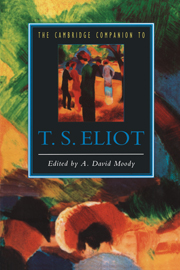Book contents
- Frontmatter
- 1 Where is the real T. S. Eliot? or, The Life of the Poet
- 2 Eliot as a product of America
- 3 Eliot as philosopher
- 4 T. S. Eliot's critical program
- 5 The social critic and his discontents
- 6 Religion, literature, and society in the work of T. S. Eliot
- 7 “England and nowhere”
- 8 Early poems
- 9 Improper desire
- 10 Ash-Wednesday
- 11 Four Quartets
- 12 Pereira and after
- 13 “Mature poets steal”
- 14 Eliot's impact on twentieth-century Anglo-American poetry
- 15 Tradition and T. S. Eliot
- 16 Eliot
- 17 Eliot studies
- A Select Booklist
- Index
17 - Eliot studies
a review and a select booklist
Published online by Cambridge University Press: 28 May 2006
- Frontmatter
- 1 Where is the real T. S. Eliot? or, The Life of the Poet
- 2 Eliot as a product of America
- 3 Eliot as philosopher
- 4 T. S. Eliot's critical program
- 5 The social critic and his discontents
- 6 Religion, literature, and society in the work of T. S. Eliot
- 7 “England and nowhere”
- 8 Early poems
- 9 Improper desire
- 10 Ash-Wednesday
- 11 Four Quartets
- 12 Pereira and after
- 13 “Mature poets steal”
- 14 Eliot's impact on twentieth-century Anglo-American poetry
- 15 Tradition and T. S. Eliot
- 16 Eliot
- 17 Eliot studies
- A Select Booklist
- Index
Summary
Readers coming to T. S. Eliot at the beginning of the last decade of the twentieth century will find no complete edition of his writings and no comprehensive catalog of unpublished materials. They will discover, moreover, that many important documents are sequestered in research collections in England and the United States and many manuscripts are sealed well into the twenty-first century. Readers venturing into the secondary writings will find a dark and tangled wood of opinions and counter opinions. The biographies that exist range from partisan to abusive; none are satisfactory, for no biographer has had access to Eliot's papers. Literary criticism fills several library shelves, but it often obscures the poet and his work or, in the interest of cultural politics, turns him into a straw man. Writings about Eliot range from excellent to useless, from reasonably objective to wildly subjective, and for the innocent reader (the non-specialist), it is difficult to know which is which.
Most Eliot manuscripts and papers are located in the United States and England. The most extensive American holding is the T. S. Eliot Collection in the Houghton Library at Harvard University. This collection, the gift of the poet's brother Henry, contains manuscripts, letters, and family photographs. The Beinecke Library at Yale University has a few Eliot items and will eventually receive the major collection accumulated by the poet's bibliographer Donald Gallup. The Berg Collection of the New York Public Library contains Eliot's early poetry notebooks, The Waste Land manuscripts, and other materials the poet had given to his patron John Quinn. The Ransom Humanities Research Center at the University of Texas has a major Eliot Collection, including manuscripts, letters, periodicals, and first editions.
- Type
- Chapter
- Information
- The Cambridge Companion to T. S. Eliot , pp. 236 - 246Publisher: Cambridge University PressPrint publication year: 1994



